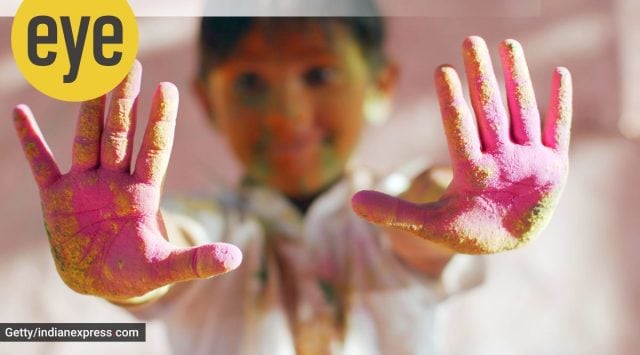Autism calls for advocacy not apology
Because all our children light up our world
 Being an advocate means complete acceptance of our children (Source: Getty Images/Thinkstock)
Being an advocate means complete acceptance of our children (Source: Getty Images/Thinkstock)Roni has been in my room for just 10 minutes and already my room looks as if a tiny hurricane has swept through it. Books are out of the bookshelves, the toys strewn, colour pencils spilt all over the floor. His mother, Naina, is trying to hold on to his flailing limbs and simultaneously apologising to me repeatedly. After some combined effort, the little one does settle down with playdough. As we knead and pound some shapes together, I turn to her, “You don’t have to say sorry to me.”
Naina replies, ironically with an apology, “I am so sorry but it has become my habit now. I apologise to his teachers when they complain about him, to the shopkeepers, people in the restaurant, to my neighbours… everywhere.” “What is the apology for?” I wonder aloud. Naina, checking on her little boy who, by now, had nestled in her lap for a nap, says, “People think there is something wrong with him and blame me for not doing my job well. There is so much shame and guilt.”
I say to her, ruefully, “Shame and guilt could be the middle name for every mother I have met in my life including myself.”
Naina tells me with tears in her eyes, “I can never get it right no matter how much I try. My in-laws think it is all my fault; my husband thinks I am too strict; teachers think I am not strict enough; therapists say I am too anxious. When I look at other mothers I worry I am not doing enough,”
This is an echo of a conversation that I have had with multiple mothers of neuro-divergent children, including myself. Where shame and guilt sit heavily on our shoulders dictating our worth, defining our enoughness, isolating us in silence. It robs us of our sense of agency as we start measuring ourselves, our children, and each other through the normative lens of society. Just visualise a child having a meltdown, screaming and where do the fingers point immediately? Yes, the mother.
Children with autism live in a world that fails them in so many ways. Blaming the mother becomes a quick and convenient way to shrug off our collective responsibility. April is celebrated as Autism Acceptance Month: let’s not forget that along with accepting children with autism we have to accept their mothers, too. There is no cookie-cutter approach to parenting. We are all doing the best we can with the skills and resources we have.
What gives me hope and always fills me with awe is the mothers with children with autism who refuse to let victimhood define their identity. As a mother and a therapist, their fiery spirit fascinates me a lot and therefore I did a short survey with them to find out what advice they would have for young mothers like Naina, who have just started this journey of “Advocacy, No apology”. Here are some of the responses:
• Being an advocate means complete acceptance of our children, standing up for their rights, and being their voice till they are able to advocate for themselves so that they believe that they have a voice and a choice.
• Commit to seeing that sparkle in our children when others just see shadows. Learning to live life one day at a time, from one hour to another, moment to moment. Particularly on sludgy days when every step seems exhausting.
• Chhati taan ke chalna: (Walk with head held high and with dignity). Society rejects children who do not fit into the neat grooves designed for them. But we cannot let their judgement measure our children’s worth or even our worth.
• What sustains me is the sheer joy I get being with my son, his resilience to face a world that can be pretty hostile at times with an innocent smile. My son is my North Star and I am learning and unlearning so much from him every day.
• Therapists have to start listening to parents and taking cues from them as nobody knows the child better than parents. Our children are not case A or case B they are unique individuals in their own world. Remember we are the experts on our children; not the therapists.
• Inclusion in schools cannot be lip service or a buzzword. It is not rocket science but it takes effort, patience and commitment. And yes, a big heart!
• We need to stop the dehumanising approach of “let’s fix” the child. Children can sense when we believe that there is something wrong with them or that they are damaged. Imagine what it does to their sense of dignity to know that their parents wish they were different.
• Next time a relative rolls their eyes at your ‘badly behaved child” or your child’s teacher tells you that he is not capable of learning, take a deep breath, smile and tell them, “He experiences life differently. Let me know if you want to learn more about it.”
• Like all children, even our children need mothers who are healthy and happy. It’s not going to help you or your child if you deplete yourself to the ground.
• Khod, khod ke raasta banaya he (I have dug out my own path): There have been people in my life who have said, “She cannot finish school, she cannot do a job, she cannot get a salary”. But I decided that I will not allow it, I will not let their limited thinking hold me back or define my daughter’s life. Without grudges, as it was not that they were wrong but they were not capable of knowing better. I have faith in my daughter and in my decisions.
• Advocacy is about solidarity: There is no one right way of parenting! So let’s stop judging and instead shoulder each other up and be each others’ strength.
Mothers, it’s time we stop apologising and instead practice advocacy – for them and with them. As a young person with autism declared, “We are different and proud.”
“Different and proud,” are the words that echoed in my head as I see Roni rouse himself from his nap and watch me with an unblinking stare with his big gorgeous eyes. Naina gathers him in a tight hug and tickles him and says, “He is my sunshine. He lights up my world.” As Roni and Naina break into giggles, I smile and sigh with renewed faith, “Advocacy and not apology because all our children light up our world.”
(Shelja Sen is a narrative and family therapist, writer, co-founder of Children First. In this column she curates the know-how of the children and youth she has the honour of working with. Email her at shelja.sen@childrenfirstindia.com)
For all the latest Parenting News, download Indian Express App.



- 01
- 02
- 03
- 04
- 05




























